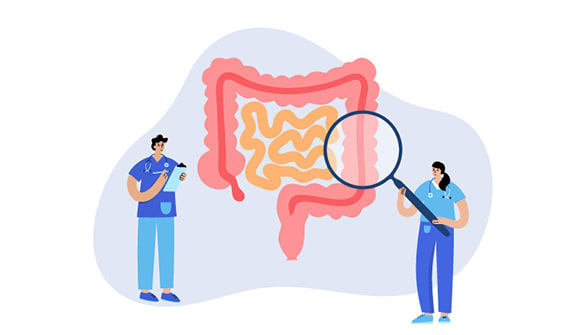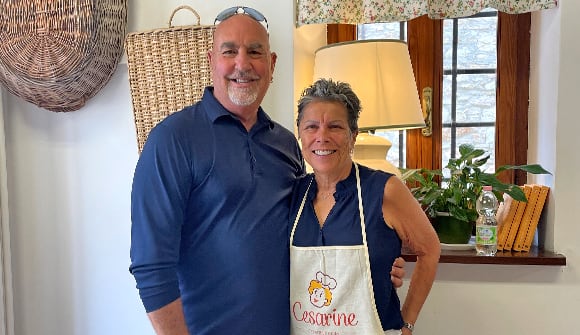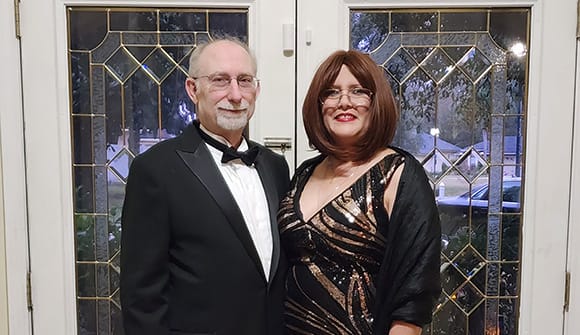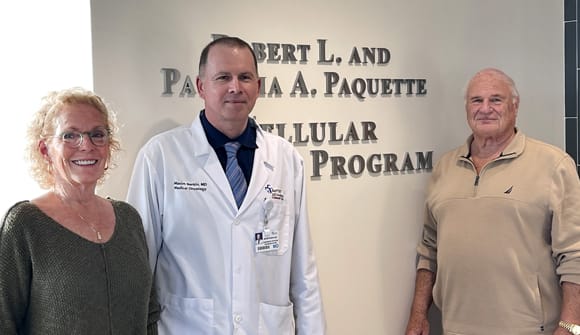Scott Webb: March is National Colorectal Cancer Awareness Month and Baptist Health and Baptist MD Anderson Cancer Center are partnering with Borland-Groover to promote colon cancer screenings throughout our community with a comprehensive campaign. The goal of this campaign, which will continue throughout the spring, is two-fold. Complete screenings for all Baptist Health employees who are eligible, but overdue for colon cancer screenings, and improve screening rates for African-Americans by completing at least 1000 screenings in our community in 2021.
And joining me to talk about the campaign and the importance of colon cancer screening is Dr. Ron Landmann. He's the Chief of the Section of Colon and Rectal Surgery for Baptist MD Anderson Cancer Center.
This is Baptist Health Radio. Baptist Health is proud to provide high quality comprehensive healthcare for every stage of life. With more than 200 points of care throughout the region, Baptist Health is ranked as the most preferred healthcare provider in Northeast Florida. I'm Scott Webb. Thanks for tuning in. Dr. Landmann, thanks so much for your time today. Tell us a little bit about this campaign.
Dr. John Landmann: March is National Colorectal Cancer Awareness month and Baptist Health and Baptist MD Anderson Kansas Center is partnering with one of the leading GI groups in town, Borland-Groover, to promote colorectal cancer screenings throughout our community with a comprehensive campaign.
The goal of our campaign, which will continue throughout the spring, is two-fold. First, we want to encourage and improve the rate of colorectal cancer screenings for all Baptist Health employees and Baptist patients who are eligible, but maybe overdue for their colorectal cancer screenings.
Additionally, we've noticed that there is a nationwide trend for lower rates of screening in the African-American and other minority groups. Accordingly, we wanted to try to encourage and improve the screening rates for our African-American and other minority groups in our community by trying to complete at least 1000 screenings in a community in the year 2021.
One of the primary reasons for this is because currently African-Americans have been found to be about 20% more likely to get and develop colorectal cancer and about 40% more likely to die from colorectal cancer than many other groups. That's why we're targeting this as one of our key focuses for this campaign.
If patients are interested in getting screened, we'd encourage them to call us at (904) 202-4YOU, once again, it's (904) 202-4YOU, for Y-O-U, or visit us at baptistjax.com/coloncancerscreening, all one word, to set up an appointment.
Scott Webb: Well, this sounds like a really worthy and timely and ambitious campaign. So let's back up just a little bit here. And let's talk about what the colon is exactly and what's its function in the body.
Dr. John Landmann: So the colon and the rectum really function as part of a waste containment and waste management role in the body. What it does is it helps absorb water for your body and then it helps eliminate waste products from your body after the body has absorbed all the nutrition from the food you eat or drink daily.
So unfortunately, the colon and rectum is also very susceptible. Because of the high turnover of all the waste and bacterial products within it, it is susceptible to developing cancers within it. And that is the reason why we have developed this colorectal cancer screening program to try to identify, in fact possibly prevent, colorectal cancer in our communities.
Scott Webb: Yeah. And of course, early detection is key. And is that the main reason why it's so important for all of us to be screened for colon cancer?
Dr. John Landmann: Indeed colorectal cancer is perhaps the second highest incidence of death of all cancers. However, it's also one of the most preventable causes of death. Most colorectal cancers are actually found incidentally, meaning most patients have no symptoms when they develop a colon or rectal cancer.
But by screening patients with colonoscopy, we are able to, number one, identify and diagnose patients with colorectal cancer. And in some cases at the time of colonoscopy, this can be both a diagnostic, but also therapeutic intervention. And in some cases, we could actually cure patients of their disease if a polyp is found early, before it even develops into colon cancer.
So unlike many other diagnostic screening modalities for other cancers, such as mammograms or PSA tests or chest x-rays and chest CTs, colonoscopy has been the one screening and diagnostic tests in the realm of cancers that can actually save lives. So that's why we highly encourage colorectal cancer screenings with colonoscopy.
Scott Webb: Yeah. I'm so glad you said it that way. It really does save lives and is pretty remarkable. So really who's eligible for colon cancer screenings?
Dr. John Landmann: As of 2018, the American Cancer Society has published their findings and their recommendations that colorectal cancer screening in the average-risk population should start at the age of 45. This is a five-year change from the traditional 50-year guideline. Similarly, other insurance companies and Medicare and other agencies have now also come down and approved colorectal cancer screening to start at the age of 45 in the average-risk population.
Patients who fall outside of that average risk population, for example, patients who have a personal or strong family history of colon and rectal cancer, patients who may have Crohn's disease or ulcerative colitis, patients who have some other genetic predisposition to colorectal cancer, either personally or in their family such as Lynch syndrome, or patients who may have had abdominal radiation or other cancers may require screening at an earlier age. However, the average-risk patient should probably get started to get this screening at the age of 45 years.
Scott Webb: Yeah. And it does seem like the major groups across the country and insurance companies, that everybody's on board. So, you know, whereas everybody had 50 in mind, now 45 seems to be the marker. So that's great to know.
Dr. John Landmann: This is one of those instances where 45 is the new 50, unlike going the other way around. But again, there's tremendous benefit in earlier detection because again, the benefit of this far outweighs all the downside of getting the prep and you can actually kill your cancer before it even develops.
Scott Webb: Yeah. And you mentioned prep there, and I think that that's one of the, you know, sort of fear points for people, that they hear about the prep whether it's anecdotally or social media, whatever it is. And they think it's a big deal, but the truth is there's been advancements in prep and it's really not a big deal. It may won't be the best night of your life, but it's not that big of a deal, is it?
Dr. John Landmann: You're correct. Perhaps the prep is the worst part of the entire process, but you're right, it's only several hours. And in the last five to ten years, there have been significant improvements in the preparations that we've utilized for performing colonoscopy, including the use of over-the-counter preparation materials such as MiraLax and Gatorade or newer preparation solutions, so to speak, that have a lower volume and also are easier to take at shorter intervals where we could actually now split the prep in the evening and in the morning of the colonoscopy.
So at this point, we have much better preparations for most patients, such that it's a lot better tolerable and the whole experience — I can't say it's going to be enjoyable — but a lot more easy to proceed with. And again, the outcomes at the end are extraordinarily rewarding.
Scott Webb: When you do sort of a risk-reward balance there and you look at it and say, "Okay, it's a rough couple of hours, perhaps for some, maybe even for most." But when you weigh that against the prevention of colon cancer, it really seems like an easy choice and whatever fears people may have about the prep, that is not a reason not to have a colonoscopy, right?
Dr. John Landmann: I certainly agree. I'm a colorectal cancer surgeon. So I operate on patients who have been found to have a colorectal cancer. And I can tell you the operation is a lot worse than the colonoscopy and the prep. And despite me making a living off of operating on patients and curing them of the cancers, I would rather encourage patients to get the colonoscopy to check and remove the polyps before it ever becomes a cancer, because that's way better than actually developing a cancer and having surgery or any additional therapy.
So yeah, when you look at it that way, one afternoon or evening of a prep and a minor procedure is way better and more tolerable for the patient than an operation or any additional treatment so that's another reason to say, "You know what? Maybe I'll do the colonoscopy to prevent myself from getting a cancer."
Scott Webb: You know, I know that colonoscopy is the gold standard for most, some maybe can't do it for some medical reasons, whatever it might be. But what are the other screening options besides colonoscopy that people might want to or need to explore?
Dr. John Landmann: I think colonoscopy still is the gold standard because it is both diagnostic and therapeutic. However, I can understand that some patients have a little worry and concern still about going through the whole process. In certain situations, some patients may also be eligible for a stool-based DNA test where patients send a sample of their stool in the comfort of their home. They send a sample of their stool in a box or in a kit. It's sent out to a lab. And that lab analyzes the stool for particular DNA fragments that are related to a precancerous or a cancerous growth within the colon or rectum. If that is found, then those patients would then have to go on and proceed to get a colonoscopy for diagnostic and therapeutic purposes.
Should patients do that stool-based DNA test, that's a test that needs to be repeated every three years, whereas a colonoscopy only needs to be repeated every seven to ten years. So there are benefits of both ways. Obviously, the stool-based DNA test is done in the comfort of your home, is not invasive, but again does need to be repeated every three years. And if it is positive, it does need to be followed up with a colonoscopy anyway.
Again, the best test, however, is a test that's actually done. So I would encourage anybody listening, if you could get a colonoscopy, go ahead and get the colonoscopy. If not, please do yourself and your family members a favor by getting a stool-based DNA test at least, so this way we can try to prevent a cancer from developing in the future.
Scott Webb: Yeah. I've heard that before that any test is better than no test. Colonoscopy is certainly the gold standard, but there are other options, which is good to know. And you mentioned earlier some of the alarming statistics for African-Americans in relationship to colon cancer, but why are some racial and ethnic groups just more at risk than others?
Dr. John Landmann: That's a good question. And we're actively investigating this together with our colleagues at MD Anderson Cancer Center and other centers throughout the country, if not the world. We've also seen an increase in what we call early-onset colorectal cancer, and that's patients under the age of 50 that are presenting with a colorectal cancer.
Traditionally, everybody thought that colorectal cancer is an old-age disease. But we are seeing the nationwide trends where a greater incidence and there's a higher prevalence of cancer in these younger populations, as well as these minorities.
More than likely, it's multifactorial due to both genetics and environmental and socioeconomic causes. However, at this time we have yet to pinpoint the reason for why certain minorities or certain age groups are developing these early-onset colorectal cancers and why some of these groups may also have more significant or more virulence or more aggressive tumors as well.
Because of all of these reasons, that's why we've encouraged earlier screening so that we can get ahead of this and try to identify those patients who develop these colorectal cancers, so we could intervene sooner and cure them so they can go on to have long, meaningful, healthy, and active lifestyles in the future.
Scott Webb: Yeah, for sure. Early detection, early intervention, all good stuff. Are there some risk factors for all of us that are just outside of our control?
Dr. John Landmann: Yeah. Maybe some risk factors that are out of some patients control, those are usually due to genetic predispositions such as patients who have family history of colorectal cancers or pre-malignant growths, such as adenomas. There are those patients who have familial adenomatous polyposis. Patients who have hereditary nonpolyposis colorectal cancer syndrome or Lynch syndrome. There are also patients who have inflammatory bowel diseases, such as Crohn's disease and ulcerative colitis. Those patients have also been shown to demonstrate nearly a 20% or a higher risk of developing colorectal cancer than the equivalent age risk population.
We've also found that patients who smoke or have a history of smoking are at increased risk of developing colorectal cancer syndrome and frankly, any cancer. So we actively encourage anybody who's smoking, even with secondhand smoke, to try to stop smoking or try to get themselves out of that smoking environment.
Though there's been no definitive proof that a low-fiber diet causes cancer, but we do encourage a high-fiber diet as part of a healthy colorectal-healthy diet, such as fruits, vegetables, whole grains, just a well-balanced healthy diet.
Other risk factors that predispose patients to developing colorectal cancer, one of them is being overweight or obese. Those patients who have been shown to be overweight or obese do have a higher incidence of colorectal cancer. Also patients who are less physically active have also demonstrated an increased risk of developing colorectal cancer.
Those latter two may be kind of tied hand in hand. Again, however, we encourage patients to try to maintain an active lifestyle. So if you're smoking, to stop smoking. If you have more of a sedentary lifestyle, to try to get out there and just walk. We've shown that just walking on a straight path, not up an incline or super fast, but just walking for one or two miles a day has been shown to dramatically increase overall health status and help to decrease patient's weight and eventually lower the risk of colorectal cancer as well and other cancers. Lifestyle as well as other factors can significantly impact your risk, but you can also improve your risk by changing these yourself.
Scott Webb: Doctor, this has been really informational today. You are truly a wealth of information. As we wrap up here, anything else you want to tell people about the campaign that you have going? Anything else you want to tell people, doctor?
Dr. John Landmann: Yeah. So again, thank you very much for having us. What we'd like to do again is encourage anybody listening to get screened by calling (904) 202-4YOU or visiting baptistjax.com/coloncancerscreening. There are several options available, whether you do an at-home test or a colonoscopy, that can be both diagnostic and therapeutic.
And if you do develop a colorectal cancer, there are opportunities to really get excellent care and management for this so that you could go on and have a healthy active lifestyle. And by going to an accredited cancer center such as Baptist MD Anderson Cancer Center, we can really provide the latest and cutting edge technologies and interventions in a multidisciplinary approach to really get patients the absolute best care that they deserve.
So again, any tests that you can get, any screening is the best screening. And if you do get diagnosed, we're here to help you and your family members so they can have the best long-term outcome and quality of life.
Scott Webb: That's perfect. Thank you so much, doctor. You stay well.
Dr. John Landmann: Thank you very much.
Scott Webb: And remember to schedule your screening by calling (904) 202-4YOU, that's the number four, or visiting baptistjax.com/coloncancerscreening. And thanks for tuning into Baptist Health Radio. If you enjoyed this podcast, please share it with friends and family and be sure to check out our entire podcast library for additional topics of interest.
I'm Scott Webb. Thanks for listening. And we'll talk again next time.





